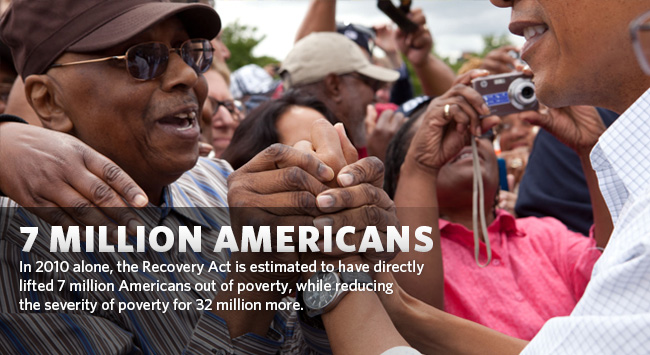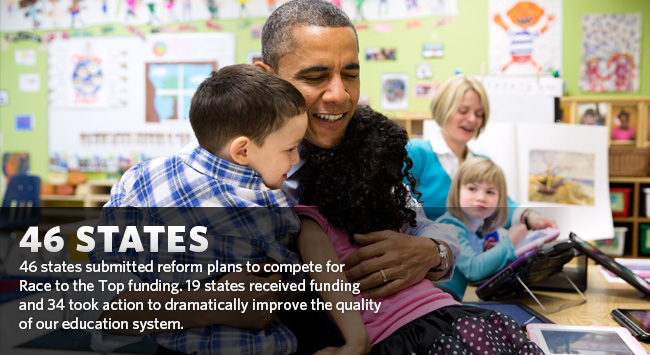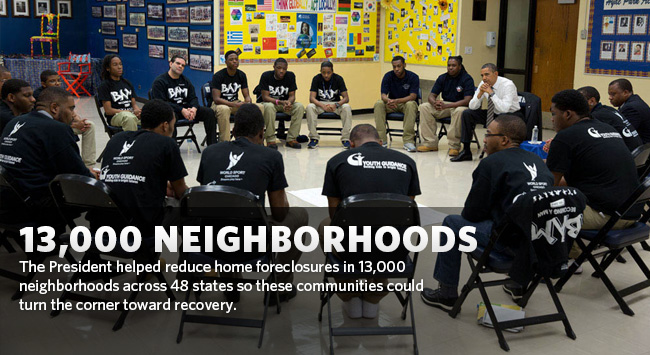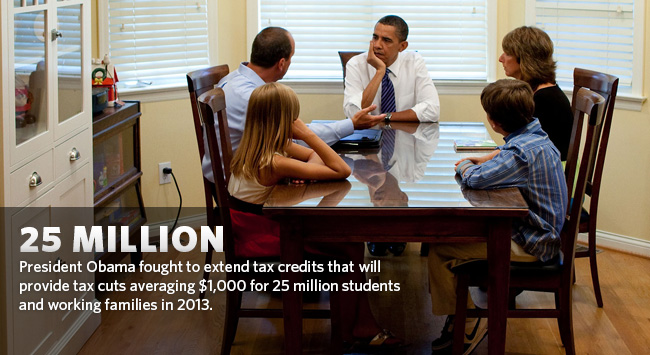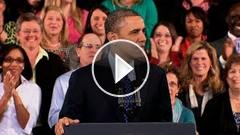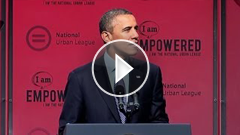Ladders of Opportunity
“We are true to our creed when a little girl born into the bleakest poverty knows that she has the same chance to succeed as anybody else, because she is an American; she is free, and she is equal, not just in the eyes of God but also in our own.”
– President Barack Obama, Inaugural Address,
January 21, 2013
Creating Economic Opportunity
The President’s plan builds on the progress we’ve made over the last four years to expand opportunity for every American and every community willing to do the work to lift themselves up. But there is no one-size-fits-all solution to the challenges we face. The following are a few of the tools that the Obama Administration is pursuing to build ladders of opportunity for America’s children and their families.
Table of Contents
Rewarding Hard Work by Raising the Minimum Wage
![]()
A rising, thriving middle class is the engine of economic growth. The President believes that no one who works full-time should have to raise their family in poverty. But right now, someone working hard full-time for the minimum wage makes $14,500 a year – which leaves families struggling to make ends meet. Even counting tax relief for working families, a family of four supported by that hard worker is still living below the poverty line. That’s why the President is calling on Congress to raise the Federal minimum wage to $9.00 and index it to inflation thereafter, so that working families can keep up with rising costs, get ahead, and be financially self-sufficient.
Raising the minimum wage to $9 would directly boost the wages of about 15 million workers by the end of 2015. For a working family earning $20,000 - $30,000, the extra $3,500 per year from raising the minimum wage would cover a family’s spending on groceries for a year, utilities for a year, spending on gasoline and clothing for a year, and six months of housing.
Read more about President Obama's plan to raise the minimum wage
Providing High Quality Early Childhood Education
The beginning years of a child’s life are critical for building the early foundation needed for success later in school and in life. Leading economists agree that high-quality early learning programs can help level the playing field for children from lower-income families on vocabulary, social and emotional development, while helping students to stay on track and stay engaged in the early elementary grades. Children who attend these programs are more likely to do well in school, find good jobs, and succeed in their careers than those who don’t. And research has shown that taxpayers receive a high average return on investments in high-quality early childhood education, with savings in areas like improved educational outcomes, increased labor productivity, and a reduction in crime.
![]()
The President’s Preschool for All initiative will improve quality and expand access to preschool, through a partnership with all 50 states, to provide all low and moderate income four year olds with high-quality preschool, while encouraging States to serve additional four-year-olds from middle-class families. The initiative also promotes access to full-day kindergarten and high-quality early education programs for children under age four. This initiative is financed by raising the Federal tax on cigarettes and other tobacco products, which would also have substantial public health impacts, particularly by reducing youth smoking.

President Barack Obama participates in a literacy lesson with children while visiting a pre-kindergarten classroom at Moravia Elementary School in Baltimore, Md., May 17, 2013. (Official White House Photo by Pete Souza)
In addition, the President is proposing to make a significant investment in early learning opportunities for our youngest children—birth through age three—by expanding Early Head Start, child care, and other health and education programs. The President’s proposal calls on Congress to make a $1.6 billion investment, focusing on our existing infrastructure of federally-funded programs to build stronger partnerships, expand services and boost quality. For our youngest at-risk children and parents, the President has proposed a substantial investment, $15 billion over 10 years, to extend and expand voluntary home visiting programs that provide nurses, social workers, and other professionals to connect families to assistance that will improve a child’s health, development, and ability to learn, as well as make hard working families more self-sufficient. This will help ensure that our most vulnerable Americans are on track from birth, and that later educational investments rest upon a strong foundation.
Read more about the President’s early childhood proposal in the FY14 budget
These initiatives are building on successes during the President’s first term, including the Race to the Top – Early learning Challenge that has rewarded 14 states that have agreed to raise the bar on the quality of their early childhood education programs, established higher standards across programs and provide critical links with health, nutrition, mental health, and family support for our neediest children. President Obama has also made historic investments in the Head Start and Early Head Start programs to reach an additional 61,000 children. The Obama Administration has also implemented needed reform in the Head Start program by identifying lower-performing grantees and ensuring that those failing to meet new, rigorous benchmarks face new competition for continued federal funding
Read more about the President’s past commitments to early childhood education
Creating Pathways to Jobs
The President is proposing to help low-income youth find summer and year-round jobs to teach our young people the real world skills they need to find a job. His proposals would also provide training and job opportunities for those who have lost their jobs and are struggling to find work. These steps are critical to ensuring that our economic recovery reaches all Americans.
![]()
The President has proposed a $12.5 billion Pathways Back to Work Fund to help support job and work-based training opportunities for the long term unemployed and youth seeking skills and wanting to get into the workplace. The President’s Pathways Back to Work Fund would build upon the success in the Recovery Act, which helped place 372,000 low-income youth into summer and year-round employment and supported job opportunities for about 260,000 low-income individuals in 2009 and 2010. In addition, the President continues to build public-private partnerships to provide opportunities for low income youth.
Recognizing that the opportunity to acquire the skills to get and keep a good job starts early and through education, the President is also proposing a significant investment to modernize America’s high schools for real-world learning. This new competition will kick-start a redesign of high schools to focus on providing challenging, relevant experiences, and reward schools that develop new partnerships with colleges and employers, and that create classes that focus on technology, science, engineering, and other skills today’s employers are demanding to fill jobs open now and in the future.
The Administration is using all available tools to help people who have lost their jobs to find new work or to train for new careers in growth fields that will provide better jobs and paths to viable careers. This includes supporting training opportunities that lead directly to a job, and making sure our unemployment system promotes re-employment through wide-ranging reforms to the unemployment insurance program, some of which were adopted in the Middle Class Tax Relief and Jobs Creation Act of 2012.
Supporting Strong Families
The President has said that to move this country closer to our founding vision that no matter who you are, or where you come from, here in America, you can decide your own destiny, we all must all play our part. This includes growing our economy to create more good jobs, equipping every American with the skills and the training to fill those jobs, and rebuilding ladders of opportunity for everybody willing to climb them. The first rung of the ladder is at home.
![]()
The President has often said that there is no more important ingredient for success than strong, stable families. This means doing more to support parents and families; continuing his commitment to support healthy marriages for all couples, including removing deterrents for low-income couples to get married; and supporting the critical role that fathers play in enhancing the intellectual, emotional, and financial well-being of their sons and daughters. The Administration is proposing to allow existing federal programs, like the child support program, implement models that get more men working and engaging with their children.
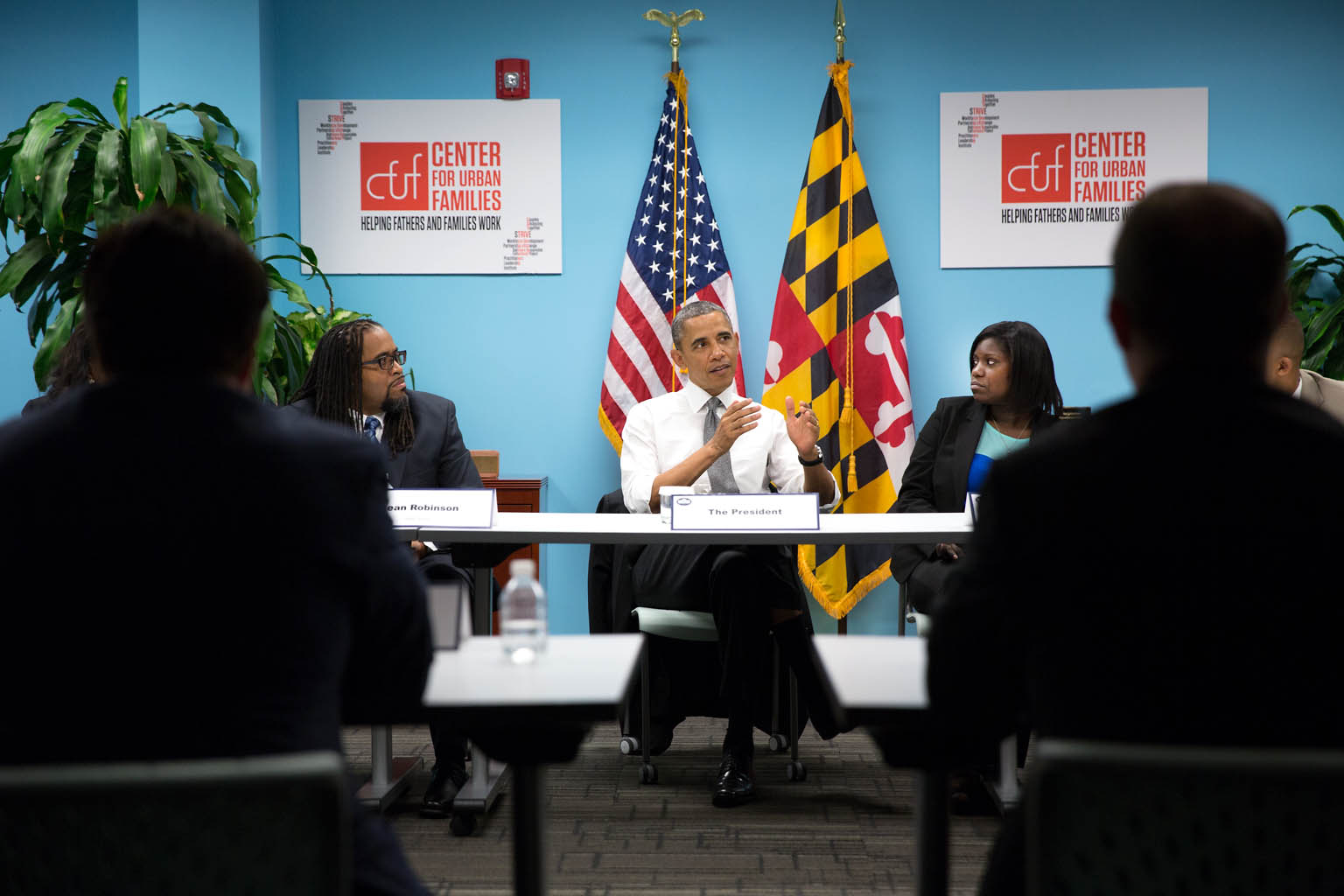
President Barack Obama participates in a roundtable at the Center for Urban Families in Baltimore, Md ., May 17, 2013. (Official White House Photo by Pete Souza)
While providing substantial tax relief to middle class families, including proposals in the FY14 proposed budget, the President has also fought to extend an expansion of the Earned Income Tax Credit (EITC) that reduces “marriage penalties” in the tax code for working parents with children.
Increasing Access to Healthy Food
![]()
Improving School Meals
Numerous studies indicate inadequate nutrition can be a significant cause for lower academic performance including grades, test scores and ability to concentrate in class. That is one of many reasons why improving child nutrition and healthy eating is a focal point for the Obama Administration.
President Obama strongly supported the passage of the Healthy, Hunger-Free Kids Act of 2010, which included significant reforms to the school lunch and breakfast programs for the first time in over 15 years. The groundbreaking legislation is helping American public schools offer healthier school meals for tens of millions of American children. And in January 2012, the Administration released new school meal regulations to boost the quality and nutrition of our national school lunch and breakfast programs — including offering more fruits, vegetables, and whole grains and less sodium, saturated fat, and trans fats. Through the HealthierUS School Challenge, more than 5,000 schools now meet high standards in nutrition and fitness — and the list continues to grow.
![]()
Ensuring Adequate Nutrition
For the 45 million low-income Americans that participate each month, the Supplemental Nutrition Assistance Program (SNAP) is an important economic lifeline. In fact, about half of the 45 million participants are children.
President Obama preserved SNAP to ensure that the millions of individuals and children that participate each month continue to have the means to put food on the table. In 2010, the Recovery Act investments in the SNAP program kept an additional 3.9 million people, including 1.7 million children, above the poverty line. In addition, the error rate of payments in the SNAP program is at its lowest point in the program’s history.
Increasing Financial Literacy
No issue is currently more important to this country than restoring financial security for all families in the wake of the greatest economic crisis since the Great Depression. From saving for retirement and higher education to better understanding credit card, student loan, and mortgage debt — personal financial decisions have important ramifications for families. This requires empowering every individual with the knowledge, skills, and access to the necessary tools to manage their finances effectively.
This Administration is committed to providing tools that help people become financially self-sufficient in order to save to buy a home, send their kids to college, start their own business, and save to enjoy a secure retirement.
![]()
Protecting American Families from Unfair Financial Practices
In the wake of the financial crisis, President Obama’s Administration worked with Congress to pass the Wall Street Reform and Consumer Protection Act into law, which established the Consumer Financial Protection Bureau. The most far reaching Wall Street reform in history, this law will prevent the excessive risk-taking that led to the financial crisis while providing common-sense protections for American families.
![]()
Building Partnerships to Reach all Americans
In May 2012, the White House partnered with the Consumer Financial Protection Bureau and federal agencies to support the ongoing efforts of the President’s Advisory Council on Financial Capability to promote financial capability by bringing together numerous private and public actors that are modeling promising practices to empower Americans with the information and skills needed to make key financial decisions. A series of private commitments and a resource guide were simultaneously announced to help further the reach to youth, employees, and communities across the country.
![]()
Sparking Entrepreneurship
Through the U.S. Small Business Administration, the President supports a number of efforts aimed at growing entrepreneurship activity in our nation's underserved communities. In an effort to promote economic development in urban and rural communities, small businesses can apply for the SBA's Historically Underutilized Business Zone designation which allows these businesses to gain preferential access to federal procurement opportunities. The SBA also has over 14,000 business counselors and mentors located in communities all across the country who focus on offering free and low-cost business assistance. In an effort to obtain advice and counsel on how to best serve urban and other underserved communities, the SBA has created an Advisory Council on Underserved Communities chaired by Radio One Founder, Cathy Hughes.
![]()
Providing Financial Tools for Students
The Administration announced the College Scorecard, as part of President Obama’s continued efforts to hold colleges accountable for cost, value and quality and make it easier for students to make more informed decisions about college. This work complements the ongoing efforts of the Consumer Protection Financial Bureau to support students through tools like the Know Before You Owe financial aid shopping sheet to make informed decisions about college costs and the Student Debt Repayment Assistant to help students repay college debt. In addition, the U.S. Department of Education is matching college funds for 10,000 low-income middle school and high school students who participate in the Gaining Early Awareness and Readiness for Undergraduate Programs (GEAR UP) initiative for college savings accounts.
Providing a First Step Toward Retirement Saving
President Obama tasked the U.S. Department of the Treasury with creating myRA, a retirement savings account designed to help more Americans start saving for retirement. myRA makes it easy for people to get on the path toward a more secure future. It costs nothing to open a myRA account, there are no fees, and no complicated investment options. Plus, the account carries no risk of losing money and is backed by the U.S. Treasury – it’s simple, safe, and affordable. Savers can fund their myRA accounts from a paycheck, a checking or savings account, or their federal tax refund. To learn more or to sign up for a myRA, visit myRA.gov.
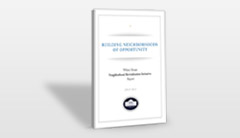
Download Reports
Read more about the policies and initiatives that the Obama Administration has taken to help strengthen our communities.
- Creating Pathways to Opportunity
- Promoting Responsible Fatherhood
- Neighborhood Revitalization Initiative
- Federal Strategic Plan to Prevent and End Homelessness
- Partnership for Sustainable Communities
Featured Videos

We’re not a nation of people who are looking for handouts… But we do expect hard work to pay off. We do expect responsibility to be rewarded. We do expect that if you put in enough effort, you should be able to find a job that pays the bills. You should be able to own a home you call your own.... You should be able to give your kids the best possible education.

President Barack Obama
July 25, 2012
